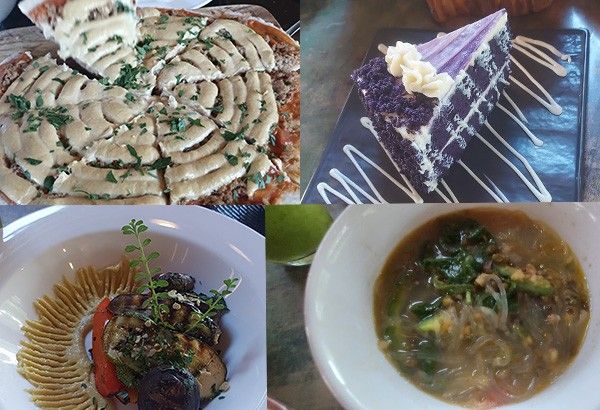National Food Month: Go for indigenous vegetables instead of imported crops – DOST, The Farm at San Benito
MANILA, Philippines — When one says “healthy diet,” salad is among the first things that come to mind, and to make a salad, people think about vegetables such as lettuce and kale.
While green leafy vegetables like arugula and parsley are nutritious and sound fancy, doctor Michelle Domalaon of holistic medical wellness resort The Farm at San Benito echoed the Department of Science and Technology’s (DOST) recommendation for local Philippine diners to prioritize eating indigenous vegetables over imported ones.
Every person has 38 trillion cells, but “there’s no such thing as forever,” Domalaon told Philstar.com in an exclusive interview.
“Every cell has an average life span of only 120 days. Our skin just lasts 20 weeks. For as long as the body has ingredients, it can make new cells. If there are no ingredients, it will recycle what’s in the body, but of course, you don’t want to use the same ingredients for your cells for the rest of your life, because the more that you recycle red blood cells, the more that their production materials weaken. Of course, you have to give new construction materials for the body to create new cells,” she explained.
These construction materials include green leafy vegetables. “I suggest that we use what’s readily available in the Philippines like malunggay, pechay, dahon ng sili, alugbati, talbos ng kamote, kangkong. We have a lot of indigenous vegetables in the Philippines. We can use them to make red blood cells,” Dr. Domalaon enthused.
“Since we’re Filipinos, indigenous vegetables are more appropriate to our body.”
According to DOST, “Vegetables are valued not only for their contribution to fiber in the diet, but also for nutrient content. Furthermore, green leafy and yellow vegetables are rich in iron, vitamin A, vitamin C, calcium, and other micronutrients.”
DOST cited the Nutritional Guidelines for Filipinos (NGF) revised in 2012, which not only recommends eating a variety of food every day but also eating more vegetables and fruits daily to get the essential vitamins, minerals, and fiber for regulation of body processes.
The highlight of NGF, said DOST, is the promotion of 10 indigenous Philippine vegetables, and these include:
alugbati (Basella alba),
ampalaya (bitter gourd) for leaves or bayok-bayok (Momordicacharantia),
himbabao (Allaeanthusluzonicus),
kulitis (Amaranthus),
labong (bamboo shoot),
upo or bottle gourd (Lagenariasiceria),
malunggay (Moringa),
pako (fiddlehead),
saluyot (Corchorus),
and talinum (Talinumtriangulare).
According to DOST, indigenous vegetables should be prioritized since these are grown in local farms whose processes are easily seen and known by its consumers, unlike imported ones where the use of chemicals and fertilizers are unknown. Likewise, vegetables are less likely to contact contaminants and other toxins if there is a shorter travel time between the farms and the market.
The Farm’s head chef Rosemarie “Chef Marie” Pagcaliwagan told Philstar.com that in The Farm, for example, the vegetables are smaller than usual, it is because these are spared from harmful chemicals and are picked straight from the resort’s own farms, to be directly prepared to be served in the resort’s four restaurants.
Philstar.com/Deni Rose M. Afinidad-Bernardo
Such farm-to-table practice helped The Farm at San Benito to recently obtain a Halal certification that marks a significant step toward it becoming a globally-recognized inclusive healing sanctuary. The Philippines’ Department of Tourism (DOT) commends The Farm at San Benito for its dedication to providing diverse and culturally sensitive experiences for all guests.
“Having The Farm at San Benito as one of DOT’s partners in Halal and Muslim-friendly Tourism spells great news for the entire industry. The Farm offers a holistic wellness experience that is a reflection of our unique and vibrant national identity, and their efforts in keeping our Muslim brothers and sisters as top of mind is definitely commendable. We are hoping for more valuable partnerships, and for The Farm to be one of the flagbearers of the Filipino brand of Halal and Muslim-friendly Wellness Tourism,” said DOT Undersecretary Myra Paz Valderossa-Abubakar.
In response to the increasing demand for Muslim-friendly destinations, The Farm at San Benito has not only achieved Halal certification for Alive! Vegan Restaurant, but also as a Muslim-friendly accommodation destination. The Farm aims to provide a harmonious balance between luxury, cultural sensitivity, and holistic well-being.
Philstar.com/Deni Rose M. Afinidad-Bernardo
The herbs from The Farm’s own gardens are combined and used to detoxify the stomach and liver and to strengthen the internal organs, Dr. Domalaon said.
Apart from a healthy lifestyle, local gardens such as those in The Farm help promote the production and consumption of local vegetables for a sustainable and healthy living among the youth, said DOST.
Philstar.com/Deni Rose M. Afinidad-Bernardo
Philstar.com/Deni Rose M. Afinidad-Bernardo
“Sustainable food sources, like gardens, are important especially in times of low food production, while the utilization of indigenous vegetables can provide a variation in the diet of the household that help in forming correct behaviors towards healthy eating among children,” DOST explained.
“The introduction of indigenous vegetables to school children familiarizes them with the local produce rather than solely consuming and opting for high-yielding and foreign crops. Using indigenous vegetables in supplementary feeding programs also decreases the cost of menu and allows for proper knowledge information to ensure continuous consumption of healthy foods among school-aged children.”
Philstar.com/Deni Rose M. Afinidad-Bernardo




